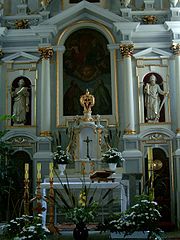
A History Of The Mass And Its Ceremonies In The Eastern And Western Church -Rev John O'Brien A.M.
TO WHAT MASSES THE CREED IS PROPER
The Creed is said on all the Sundays of the year, in memory of our Lord’s resurrection on that day, and also out of deference to the Adorable Trinity, to whom Sunday, as being the principal liturgical day, is dedicated. During the rest of the week the Creed, as a general rule, is not said. Formerly it was not said on the feasts of the Holy Angels, inasmuch as they had nothing to do with it, but it is said now because they come under the “invisibilium omnium” (Ferraris, p. 751). It will interest the reader to know that St. Mary Magdalene is the only female saint in heaven—the Mother of God alone excepted—who enjoys the privilege of having a Credo in her Mass, and this because, in the language of the Church, she is styled “Apostola Apostolorum”—the Apostle of Apostles—for it was to her, as the Scriptures testify, that our Lord first appeared after his resurrection. The other occasions upon which the Credo is said are, with few exceptions, comprehended under the old dictum of rubricists, “Muc non credunt.” Taking the letters of Muc apart, we have “m,” which stands for martyrs; “u,” or “v,” for virgins, widows, and non-virgins; and “c,” for confessors, all of whom have no Credo special to them. As exceptions to this rule may be mentioned the feasts of the apostles and doctors of the Church, also those of our Lord and his Blessed Mother. With us the Creed is never said in Masses for the dead, but it is with the Greeks, who also on such occasions celebrate in red vestments instead of black, as is our custom.

 Support Site Improvements
Support Site Improvements